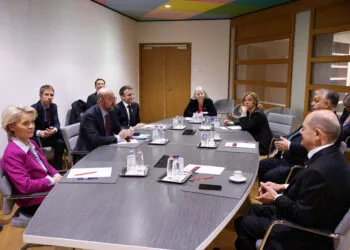from the Strasbourg correspondent – “Cancel the rotating presidency, freeze all European funds, and proceed with the treaty article that allows taking away voting rights in the council.” The most determined are Tineke Strik and Damian Boeselanger. The two Green MEPs are calling for a tough punch against Viktor Orban’s Hungary, which becomes the subject of criticism and a central topic of the parliament’s debate on the conclusions of the February 1 extraordinary summit of heads of state and government.
It is true that in the end, the EU found an equilibrium, but the Hungarian prime minister remains the elephant in the twelve-star negotiating room, for expressing himself in more pro-Russia than pro-Ukraine terms and for his resorting to using the requirement of unanimity as a veritable veto. Something which is the last straw for the European Parliament. “We avoided the veto until the next time,” denounces Katalin Cseh, a liberal. “It’s a sign that something is not working in our decision-making system,” leading the Renew Europe member to call for an override of unanimous voting.
They did not like how Orban forced the 27 member countries to postpone by two months the agreement for 50 billion euro support for Ukraine. “Orban is holding Ukrainians hostage,” denounces Nikolaj Villumsen (The Left), who is convinced that it is time to “put a stop to Orban’s vetoes.” The road is the one traced mainly by the Green Group. “It is time to move forward with article 7” of the Treaty on the Functioning of the European Union, stresses Terry Reintke, co-chair of the Greens. The article in question provides for the suspension of voting rights in the council for member states in continuous and serious violation of EU principles.
The European Union initiated the 2018 indictment of Hungary, and the proceedings remain open. “Now we have to make sure that the Article 7 device is used” against Orban, insists Green co-chair Reintke., who finds backing among socialists. Even Gabriele Bischoff (S&D) believes “Article 7 should be used” against Hungary.
Words that clashed against the very different tone of the head of the People’s Party (EPP) group, Manfred Weber, who criticized but did not lunge. “Ukraine will win the war and become an EU member state,” he presses in a clear call to support Kyiv in the war against Moscow. Then he chooses the soft line when, returning to the agreement found in the council, he says that “Orban finally understood that the only way forward is to work with Europe instead of against Europe.”
The president of the European Council, Charles Michel, focuses on the positive aspect of the debate: the final agreement. “We have shown unity and determination.” Thus a clarification, which serves as a reminder to Orban. “Every euro spent on Ukraine is a euro invested in our security.” He does not comment on the possibility of cancelling the rotating presidency that Hungary is scheduled to hold from July 1 to Dec. 31, 2024. He avoids rifts. But the Strasbourg debate once again certifies the “Orban problem”.
Iraxte Garcia Perez, the president of the Socialist Group, goes further. She doesn’t just criticize Orban but attacks both Prime Minister Giorgia Meloni, and the People’s Party leader, Manfred Weber. “Some rather strange alliances are being created,” she says at a press conference on the sidelines of the House. On the one hand the flirtation between the leaders of Italy and Hungary, on the other the EPP’s wink at the ECR.
“Meloni seems to have been decisive in convincing Orban for the deal at the European Council, perhaps with a commitment that in the next legislature Orban’s party could switch from the Non-attached to the Conservatives,” Perez presses. Games of contradictions, since “Meloni stands as a defender of Ukraine while Orban blocks aid to it, Meloni wants a European pact on immigration and Orban opposes it.”
There is more: an unclear role of the EPP. “We want to see this idea of Weber opening his arms to conservatives. Those who did not deserve to be in the EPP today can be in a group with which Weber is making political alliances.”
English version by the Translation Service of Withub




